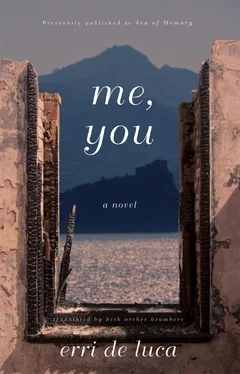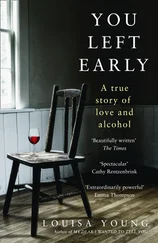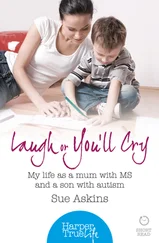
He told me a few things because I kept insisting and because that summer he began to trust the boy who copied his gestures, who came to listen to his stories without opening his mouth, without asking this or that. I never repeated his stories, nor did I ever say where I spent some of my afternoons while the other city boys vacationing on the island got together with their first girlfriends. My family didn’t ask me to account for my whereabouts, since it was customary for the discipline of the city to be relaxed on the island, except for the observance of mealtimes.
The heat unbound the body. Freedom was a change of skin accompanied by the song of cicadas. The beach was the boundary where the life of men began, a flat surface for those who saw it from the shore, but which was really full of paths, currents, crossroads, depths made shallower by shoals. The boats were keels of perils and miracles; some of them had an olive branch, blessed at Eastertime, tied to a pole in the bow for luck.
I had no personal contact with deep water, nor with those who go deep down with guns. Nicola didn’t know how to swim and taught me respect for the depths of the sea. You get from the sea what it gives, not what you want. Our nets, lines, traps, are a request. The reply does not depend on us, on fishermen. Whoever goes below to take the reply with his own two hands lacks respect for the sea. We have a right only to the surface; what lies below is the sea’s, is its life. We knock at the entrance, at the surface of the water; we must not enter as though we were masters of the house.
No fishermen armed with guns or oxygen were allowed on Uncle’s boat. Uncle saw eye to eye with Nicola. What he liked was the struggle with a grouper that burrows into its hole with a hook in its body, and you need all the power of the boat and the oars to force it out, easing it along the lay of the hole, exhausting its strength to resist. And many a time the grouper would win. By evening hands were raw from the ropes of the suspended fishing tackle that we call coffa , and sea salt was encrusted in the cuts and scrapes. These stigmata were renewed at the beginning of each season. Nicola taught me how to harden my palms with a piece of rope.

As a child I heard about the war. At home there were stories told at the table about planes swollen with bombs, sirens that gave little margin of warning, silent races to a shelter, loud growls in the sky followed by the louder growls of explosions on the ground. And once in July with no warning at all bombs fell at random from high up, tearing clumps of the living out of the world in broad daylight. Mama knew these stories: Papa was a soldier. She used to describe their races to the shelters. They fled from the house, a hundred times in their young life, burrowing into the Piedigrotta tunnel in a recurring contest with the other families. Whoever got there first had the best place. Each of us was expected to grab whatever we could and carry it to safety. Mama carried me, Grandpa snatched a suitcase kept near the door in which a set of china tried to stay intact. The women put their valuable things into a handbag that never left their arm in the shelter. Mama remembered a very poor family. The wife always kept an old handbag clutched to her chest. Her children were amazed that she had anything worth saving. One day as she was running to the shelter she fell and her treasure tumbled out: buttons. So as not to lose face, she too had provided herself with an inseparable handbag, stuffing it with buttons to make it look full. Even as bombs fell, a poor woman did not want to look inferior to the others. After that no one ever saw her again.
And after the hundred batterings, the city shook the Germans off its back like a kicking mule, with the kind of kicks that restore dignity to a people. When the Americans did not enter the city, a rebellion suddenly erupted against the Germans and the entire population formed a noose around them, turning their retreat into a rout. Finally the Americans arrived and every family adopted one. In our house there was Jim, a giant of a black man, always cheerful and hardworking. And it was Jim who saved us. After the hundred Allied bombings, a German one arrived. At the wail of the sirens no one wanted to move, it had to be a mistake, the war was over. Jim was in the house and would hear no nonsense. “No, no!” he shouted in his booming voice, forcing everyone out of the house and plucking Mama’s grandmother out of her wheelchair, while she screamed for help as she was being carried off by the colossus. And so it was that a German bomb fell smack on the building and on the family’s few possessions, evening the score with my father’s previously razed house. Mama, who always looked for the funny side when telling these stories, did not forget to add that by the time they reached the shelter, doubled up with laughter over Grandma Emilia’s shrieks in Jim’s arms, the German bombs were already exploding. She was still laughing about those bombs that had ruined her.

Stories about survival in the city, about interrupted nights, babies who didn’t cry, soldiers who escaped unhurt, German orders plastered everywhere — these ancient tales were part of childhood. But as I grew, the time span got shorter. Those events were no longer remote but recent. That past had barely taken place; the holes in the streets were still gaping. And when my folks stopped talking about it I began to ask, which they did not like. My questions must have had an insistence that I can’t remember, since they sent me to the library in their exasperation: that’s where history is, it’s all written down there, read about it all you like but leave us alone, we don’t want to revive those painful memories. Things were getting better, they talked about a new house, our own, not a rental anymore.
The war no longer entered into their stories around the table, where children became adults as a result of listening. Instead, they talked about politics, about mayors as piratic as Captain Hook. These were just pathetic news items, lacking the dimensions of adventure or satire.
That was how I learned their history, a very different subject from the one taught in school out of textbooks, which explained the past and made it logical — a free fall all the way down to us. Theirs was a history filled with infamous events, raids rather than battles, mass executions, vileness, massacres of defenseless people. It was a history that went nowhere, prepared no sequel, but aspired to be the last, the end of history. Jews — I learned the word from books about the war. Before, they were an ancient people like the Phoenicians, the Egyptians. Jews, but why children, women, old people, hunted in the most wretched places throughout Europe? Strange to learn geography by looking for the cities and regions of the dead: Volhynia, Bukovina, Podolia, Lithuania, a cemetery of flatlands had opened up in the middle of Europe and a boy from Naples looked for it amid the nations awarded to the Soviet Union.
My family stopped asking me what I was reading so as not to have to collide with my determination to know. The questions had multiplied and insidiously held them accountable. Had they taken part in the resistance, had they helped any of the persecuted? No, they hadn’t. My mother, still a girl then, had to save her family, and Papa, impoverished by the bombs, flung himself into surviving. He was nonetheless burdened by regret, not to have committed a single act of sabotage, not to have saved anyone outside of himself and his family. He was also burdened by a son who wanted answers. He no longer wanted to discuss the subject with me, so as not to jeopardize his rightful authority. He was sorry to reject my questions but they were becoming more pressing and he had to ward off any suspicion of impertinence: “How dare you speak to your father like that!” I don’t remember what “like that” was, but it must have been disrespectful.
Читать дальше













